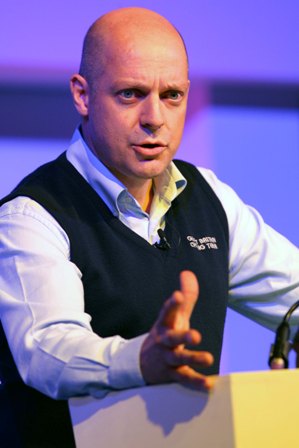
Brailsford: is this what leaders look like?
Edition number 72; dateline 4 April 2014
Leadership: we'll know it when we see it
We are grateful, as ever, to Martyn Allison who was central to the discussion that began over lunch and ended after dinner with the conclusion that the Leisure Review should run a series on leadership. And just to get things rolling, he wrote the initial article, which appeared in our February issue, in which he considers some of the issues of leadership, asks a series of questions on the nature of leaders and sets a number of challenges for those within the sport, leisure and culture sector to consider. I am pleased to report that Martyn’s article has provoked a very positive response from senior personnel across the sector who are keen to contribute to the debate. We offer the first of these articles in this issue.
While leadership has long been seen as crucial to success, it seems that the focus leadership as fundamental to any effective and properly functioning systems or organisations has sharpened considerably in recent times. The business and sports pages are awash with references to, and celebrations of, the inspirational and charismatic individuals who are assumed to be captains of their respective ships sailing towards victory and success, accolades and wealth. However, for all its importance, it is also clear that leadership is difficult to define and very difficult to implement. For many it remains akin to the US supreme court’s 1964 understanding of obscenity – “I know it when I see it” – and the travails of football managers taking the helm at teams that have previously been very successful or notably unsuccessful demonstrate just how complex the issue of leadership can be.
Sport is often held to be a useful environment for the exploration of leadership, perhaps on the grounds that the success of leaders can be measured in the simplest of terms: win or lose. While the binary nature of such a judgement may well be an advantage to such studies, it is clear that there is a bit more to leadership than a total of points accumulated at the end of the season. Football and cycling are, by way of example, two very different sports with, from a UK perspective, very different structures, ambitions and concepts of success. The recent history of both sports has been heavy on senior figures who could be said to have transformed their respective sports. Both sports can point to significant successes, not least in terms of commercial growth, expanded markets and improved performance, but in many respects the end results have been very different.
One thing that both sports seem to agree on is that Dave Brailsford is the closest thing we currently have to leadership personified. In cycling he is regarded as the man who has been instrumental in the development, expansion and delivery of unprecedented success; in football, for all its many touchline dictators and training-ground gurus, he is seen as the man who might be able to inspire, persuade or cajole more effective performances from our national squad. And yet the Sage of Ilkeston remains the very definition of a quiet operator, a self-effacing facilitator who is the antithesis of football’s usual image of leadership.
Such experiments serve to illustrate just how complex an area of expertise leadership is but also just how important leaders are. At the Leisure Review we hope we can play a small part in the exploration of leadership within the sport, leisure and culture sector while we wait to see what sort of impact the Brailsford factor might have on Team England.
Jonathan Ives
Editor
letter from the editor
The Leisure Review editorial
